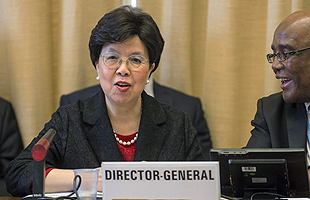In every nook and corner of the just concluded 69th World Health Assembly in Geneva , be it civil society organizations’ led event or high level ministerial led events, universal health coverage (UHC) was at the center of discussions, presentations and call to actions.
At one of the Monday 23rd May 2016 side event at World Health Organisation’s headquarters “Speaking with One Voice, Stronger Together”, a statement on harmonisation of advocacy on Health Systems Strengthening for Universal Health Coverage and the health SDGs was presented. Civil society organisations and international partners had expressed determination to achieve greater harmonisation of advocacy for health in order to achieve Sustainable Development Goals.
The statement recognised the efforts to achieve UHC for all countries – whatever their level of economic development, will require an inclusive, global movement of actors working together for health. Accountability and meaningful participation of civil society and affected populations will be critical to ensure that no one is left behind.
It also recognised diversity while acknowledging the need to combine and align efforts in order to reach the health SDGs and ensure that no one is left behind, as illustrated below;
- “We endorse the fundamental principles of UHC: that all people obtain the quality, essential health services they need (prevention, promotion, treatment, rehabilitative, palliative) without facing financial hardship. UHC promotes the realization of the right to health, disassociating access to services from ability to pay.
- We assert that UHC must not discriminate against any social groups or leave anyone behind, bringing the poorest and marginalized into coverage urgently. Closing equity gaps is imperative to the success of the SDGs on health.
- We emphasize the need for an integrated, people-centered approach: To ensure that the poorest, most marginalized and most vulnerable populations are able to reap the benefits of UHC, that all people have access to health services that are provided in a way that responds to their life course needs and preferences; and that are coordinated across the continuum of care and are safe, effective, timely, efficient and of acceptable quality.
- We support the appropriate measurement of UHC through two interrelated components of service coverage and financial protection.
- We confirm that UHC requires increased and more equitable financing: a move from out-of-pocket payments to predominant reliance on compulsory, widely pooled, pre-paid mechanisms to finance health; increased domestic resources, raised and spend equitably; and more effective aid, aligned to support national health plans, and in support of International Health Partnership+ principles.
- We support strengthening health systems as a core tenet of UHC, with a clear recognition that UHC cannot be achieved without strengthening health systems, including community systems.
- We stress the need for greater mutual accountability, encompassing the interconnected functions of monitoring, review and remedial action, as an imperative to guide, implement, and accelerate progress on the SDGs. Civil society should play a key role in this.”
What is Universal Health Coverage (UHC)?
- “All people are able to use needed health services (including prevention, promotion, treatment, rehabilitation, and palliation), of sufficient quality to be effective.”
- “Universal Health Coverage exists when all people receive the quality health services they need without suffering financial hardship. UHC combines two key elements, the first relating to people’s use of the health services they need and the second to the economic consequences of doing so.”
With respect to benefit of UHC, a WHO document ‘Arguing for Universal Health Coverage’ in 2013 observed the following;
- The first objective is that everybody should be able to access a full-range of health services including promotion, prevention, treatment, rehabilitation and palliative care. These services should be of good quality. It is of no use having access to a scanner that is poorly calibrated or run by an untrained health worker.
- The second objective is to ensure protection from the financial risk associated with seeking care. The need to pay for care at the point of use (whether through explicit policies on user fees or informal payments) discourages people from using services, and can cause financial hardship for those that do seek care. The best way around this is to expand coverage with compulsory prepayment of some type – e.g. taxes and other government charges, social insurance premiums – that are subsequently pooled to spread risks. Contributions should reflect people’s ability to pay which means that there will always need to be subsidies for the poor and vulnerable.
In answering the question “how realistic to achieve Universal Health Coverage?” Each country and most especially developing countries should evaluate their resources both human and financial as well understanding their population dynamics including those at risk populations and the most vulnerable and come up with an equitable health services that promote universal health coverage.
All comments to Dr Aminu Magashi Garba Coordinator Africa Health Budget Network & Publisher Health Reporters (healthweekly@yahoo.com)




